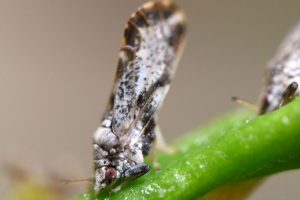At UF/IFAS, we are working on finding solutions for Florida’s citrus growers. This is a summary of one project made possible by state legislative funding for the UF/IFAS Citrus Initiative during the 2018-19 cycle. It documents how we are making progress and providing Florida growers with reasonable, pragmatic solutions to successfully grow citrus in the new age of citrus greening.
Researchers: Ozgur Batuman, Plant Pathology; Amit Levy, Plant Pathology; Kellee Britt, Plant Pathology; and Mahnaz Rashidi, Plant Pathology
IMPACT: Scientists have discovered new naturally occurring viruses that may be utilized to control psyllids without the use of potentially environmentally harmful insecticides in the future. Research suggests that the process would adversely affect psyllid biology and kill the insect or prevent the greening pathogen transmission to citrus trees.

The bacterium responsible for citrus greening disease is transmitted by a tiny flying insect, the Asian Citrus Psyllid (Diaphorina citri, ACP), when it feeds on a citrus tree’s new shoots and leaves. This invasive pest is now established throughout Florida’s commercial citrus groves, so growers use insecticide sprays that are potentially harmful for the environment as one of their primary tactics for fighting citrus greening. By reducing psyllid populations in their groves, growers hope to increase the quality of fruit and the productive lives of their trees by minimizing the number of times they are infected with the greening pathogen.
Psyllid management might be improved if scientists could harness the insect’s natural enemies as control agents, thus reducing the need for insecticide use. With this idea in mind, a UF/IFAS team led by plant pathologist Ozgur Batuman of Southwest Florida Research and Education Center has been investigating viruses that dwell within the Asian Citrus Psyllid’s digestive system, to determine whether any of them can weaken or kill the insect.
For two years, researchers made monthly collections of psyllids from commercial citrus groves in 22 central and south Florida citrus production counties, to isolate and identify microorganisms (i.e., viruses) within their bodies. They made major steps forward in identifying ACP-associated viruses as well as understanding the presence of those viruses in the Florida ACP populations for the first time since the introduction of the ACP into Florida in 1998.
Future experiments will investigate how these viruses can be manipulated so that they may alter the psyllid’s biology, as well as how they affect survival and transmission of the pathogen that causes citrus greening disease, also known as Huanglongbing or HLB.
 0
0
